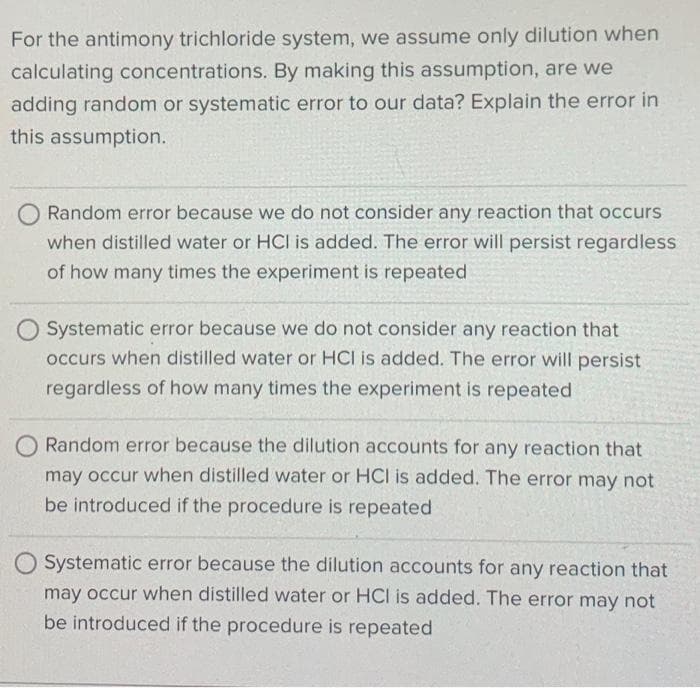For the antimony trichloride system, we assume only dilution when calculating concentrations. By making this assumption, are we adding random or systematic error to our data? Explain the error in this assumption. O Random error because we do not consider any reaction that occurs when distilled water or HCI is added. The error will persist regardless of how many times the experiment is repeated O Systematic error because we do not consider any reaction that occurs when distilled water or HCI is added. The error will persist regardless of how many times the experiment is repeated O Random error because the dilution accounts for any reaction that may occur when distilled water or HCI is added. The error may not be introduced if the procedure is repeated O Systematic error because the dilution accounts for any reaction that may occur when distilled water or HCI is added. The error may not be introduced if the procedure is repeated
For the antimony trichloride system, we assume only dilution when calculating concentrations. By making this assumption, are we adding random or systematic error to our data? Explain the error in this assumption. O Random error because we do not consider any reaction that occurs when distilled water or HCI is added. The error will persist regardless of how many times the experiment is repeated O Systematic error because we do not consider any reaction that occurs when distilled water or HCI is added. The error will persist regardless of how many times the experiment is repeated O Random error because the dilution accounts for any reaction that may occur when distilled water or HCI is added. The error may not be introduced if the procedure is repeated O Systematic error because the dilution accounts for any reaction that may occur when distilled water or HCI is added. The error may not be introduced if the procedure is repeated
Principles of Modern Chemistry
8th Edition
ISBN:9781305079113
Author:David W. Oxtoby, H. Pat Gillis, Laurie J. Butler
Publisher:David W. Oxtoby, H. Pat Gillis, Laurie J. Butler
Chapter16: Solubility And Precipitation Equilibria
Section: Chapter Questions
Problem 37P
Related questions
Question
2

Transcribed Image Text:For the antimony trichloride system, we assume only dilution when
calculating concentrations. By making this assumption, are we
adding random or systematic error to our data? Explain the error in
this assumption.
O Random error because we do not consider any reaction that occurs
when distilled water or HCI is added. The error will persist regardless
of how many times the experiment is repeated
O Systematic error because we do not consider any reaction that
occurs when distilled water or HCI is added. The error will persist
regardless of how many times the experiment is repeated
O Random error because the dilution accounts for any reaction that
may occur when distilled water or HCI is added. The error may not
be introduced if the procedure is repeated
O Systematic error because the dilution accounts for any reaction that
may occur when distilled water or HCI is added. The error may not
be introduced if the procedure is repeated
Expert Solution
This question has been solved!
Explore an expertly crafted, step-by-step solution for a thorough understanding of key concepts.
This is a popular solution!
Trending now
This is a popular solution!
Step by step
Solved in 2 steps

Knowledge Booster
Learn more about
Need a deep-dive on the concept behind this application? Look no further. Learn more about this topic, chemistry and related others by exploring similar questions and additional content below.Recommended textbooks for you

Principles of Modern Chemistry
Chemistry
ISBN:
9781305079113
Author:
David W. Oxtoby, H. Pat Gillis, Laurie J. Butler
Publisher:
Cengage Learning


Physical Chemistry
Chemistry
ISBN:
9781133958437
Author:
Ball, David W. (david Warren), BAER, Tomas
Publisher:
Wadsworth Cengage Learning,

Principles of Modern Chemistry
Chemistry
ISBN:
9781305079113
Author:
David W. Oxtoby, H. Pat Gillis, Laurie J. Butler
Publisher:
Cengage Learning


Physical Chemistry
Chemistry
ISBN:
9781133958437
Author:
Ball, David W. (david Warren), BAER, Tomas
Publisher:
Wadsworth Cengage Learning,

Chemistry: Principles and Practice
Chemistry
ISBN:
9780534420123
Author:
Daniel L. Reger, Scott R. Goode, David W. Ball, Edward Mercer
Publisher:
Cengage Learning